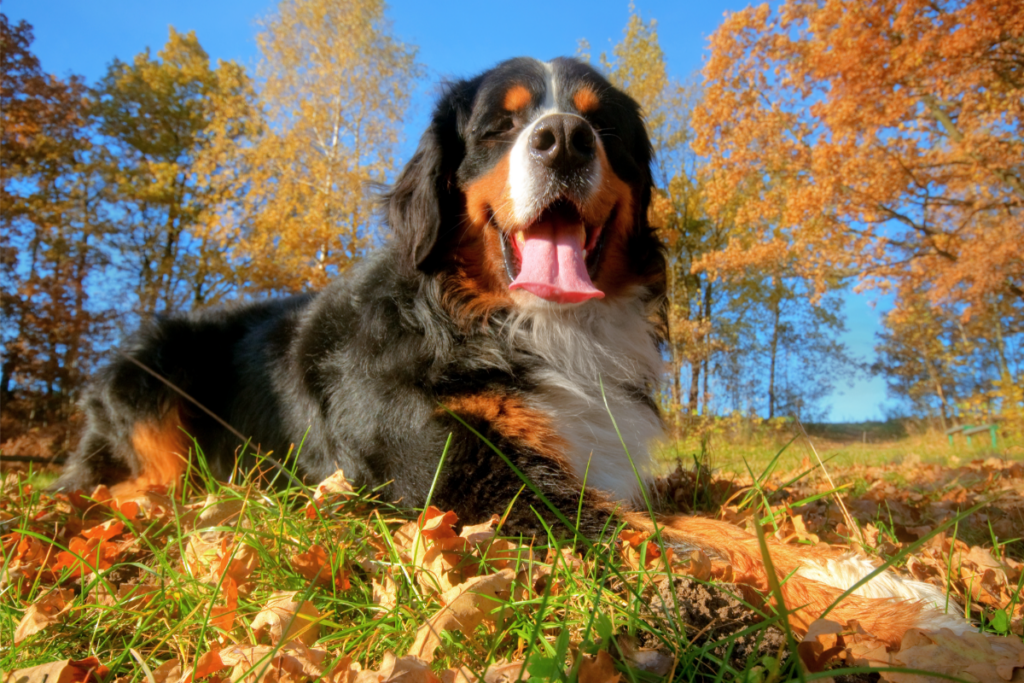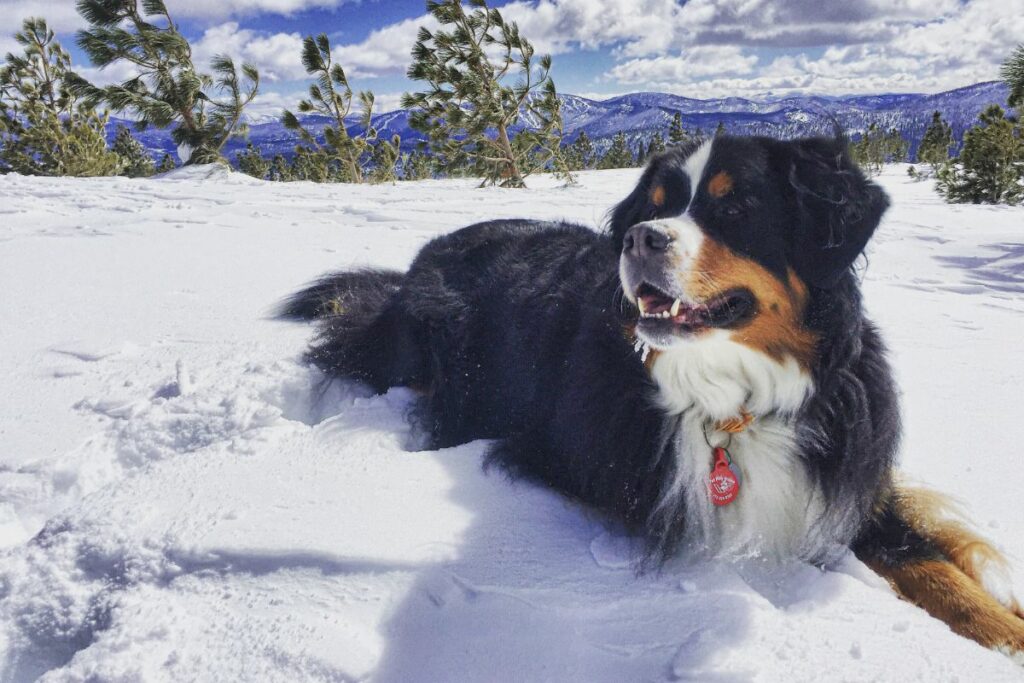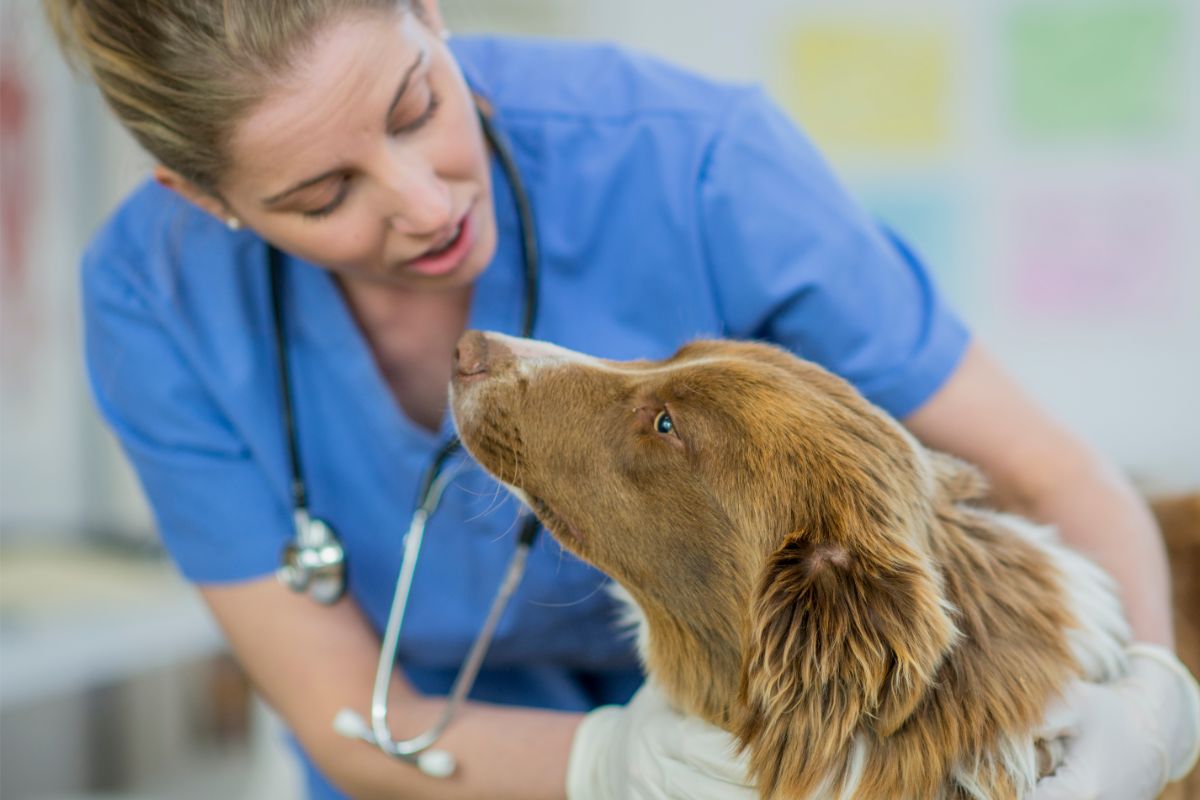Bernese Mountain Dogs are true gentle giants, and they make wonderful companions.
This stunning, tri-colored pooch has become increasingly popular as a family pet thanks to their soft nature.

In this guide, we’ll take a closer look at the breed and help you to get clued up if you’re considering introducing a Berner into your home.
Breed Facts About Bernese Mountain Dogs
The beautiful Bernese Mountain Dog heralds from the Swiss Alps and from Bern in Switzerland.
They are one of four breeds of Sennenhund from the area – the others being:
- The Appenzeller Sennenhund (The Appenzeller Mountain Dog)
- The Entlebucher Sennenhund (The Entlebucher Mountain Dog); and
- The Grosser Schweizer Sennenhund (The Greater Swiss Mountain Dog)
Bernese Mountain Dogs are large breed dogs that were originally bred to be strong, working farm dogs, and their ancestors were originally introduced to Switzerland by Roman invaders over 2000 years ago.
They are very muscular with strong backs and broad chests. They are flat-headed with floppy, triangle-shaped ears, much like Golden Retrievers.
These gentle dogs, often referred to as Berners, are recognizable by their tri-colored markings – they are a combination of black with rust and white markings.
Their coats are soft and thick, and, much like the husky, they are built to withstand cold temperatures.
Bernese Mountain Dog Average Size, Lifespan, And Key Life Stages
The Bernese Mountain Dog lifespan is around 7-10 years old, which is relatively short compared to many other breeds. We’ll look into what impacts their lifespan a little later on in this article.
Male Berners grow to be around 25 – 27.5 inches tall, and they usually weigh in at 80 – 115 pounds (36 – 52 kg).
Female Berners reach around 23 – 26 inches high, and they weigh in at roughly 70 – 85 pounds (32 – 38.5 kg).
As larger dogs, they are slow to reach their adult height and weight.
At 18 months, they will usually be at their adult height, but they don’t finish bulking out until they reach 2-3 years old and can even continue to bulk out after that point.
With this in mind, let’s take a look at what to expect at this dog’s life milestones:
- Two – Three Weeks Old: Like many other breeds, you can expect Berner pups to open their eyes at around two weeks after birth. By three weeks, they are ready to explore as they begin to walk.
- Four – Eight Weeks Old: At four weeks, you can expect those little, spiky puppy teeth to start appearing. And by the time these pups reach eight weeks old, they will be ready for their vaccinations.
- Eight – Ten Weeks Old: At eight to ten weeks old, you can expect these pups to weigh in at around 12-24 pounds, but this depends on their sex and also on the litter size. Regular vet checkups and weigh-ins will ensure your pups are on the right track.
We’d also recommend you start to train your Bernese Mountain Dog at this stage – beginning with the basics and moving on to more advanced training later. - Sixteen Weeks Old: By this point, your Berner should start to lose their milk teeth, and strong, healthy adult teeth should take their place.
- Six Months Old: By six months, your Bernese Mountain pup should be pretty well trained. This is a good time to start introducing more complex training if you wish. At this stage, your pup will weigh around 45 – 85 pounds.
- Eight Months – One-Year-Old: At this point, your Berner can be considered a young adult dog, but in reality, and as we mentioned earlier, they’re still growing.
- Eighteen Months Old: By eighteen months old, your pooch should have reached their adult height, but they will continue to fill out until they are two to three years old.
- Four – Five Years Old: When BMDs reach around 4-5 years of age, they are considered senior dogs.

Bernese Mountain Dog Personality
Now, let’s take a look at the personality of these pooches to understand what makes them gentle giants.
These dogs are not just brawn – they’re really smart, too, which makes training a whole lot easier.
As well as their smarts, Berners are huge softies. Some people may be intimidated by their size, but there is generally no need as they are loving and affectionate pooches that are particularly good with children. As such, they are perfect family dogs.
Bernese Mountain Dogs are incredibly loyal and faithful, and they love to please and spend time with their humans – often forming a very close bond with one person in the family.
They also mix well with other dogs as long as proper introductions and socialization have taken place.
Caring For Your Bernese Mountain Dog
If you’ve read everything we’ve written so far, and you’re set on becoming a Berner parent, it’s important to understand how to take the best care of them.
Below, we’ll look at their dietary requirements, as well as other essentials like exercise and grooming.
Diet
As a puppy, and until your Berner reaches somewhere between the ages of nine and 24 months, you will need to feed a good quality puppy diet.
A standard age to make the switch to adult food is around 18 months of age, but each dog is different, so it’s important to consult with your vet.
As pups, they will need to be fed more frequently. Consider splitting their daily allowance of food into 3-4 meals. When they reach around six months old, they don’t need to eat as frequently, so this can be reduced to two meals per day.
We recommend keeping a consistent feeding schedule – it’s beneficial for the household and for your Berner.
As a working breed, some owners prefer to feed Bernese Mountain Dogs a raw diet, but it’s not essential.
When choosing a suitable food, try to aim for the best quality possible.
For an adult dog, it’s advisable to select a good quality brand of dry dog food with at least 18-22% protein – this will ensure your Berner is getting the right nutrition.
Top tip: As a larger breed, it can be beneficial to find dry food with a larger kibble.
When your Bernese reaches around 4-5 years old, it’s time to move them onto a senior diet (again, check with your vet before making any changes).
Senior food will introduce more glucosamine into your dog’s diet to support their joints, as well as other essential nutrients for an aging dog.
When transitioning to new foods – whether that be changing from adult food to senior food or from one brand to another, it’s important to do it gradually, over a number of weeks, to give your dog’s stomach time to adjust.
You can give your dog the occasional treat, but we recommend making sure snacks make up no more than 10% of your Berner’s diet – we know how hard it is to resist those puppy dog eyes, though!
Exercise
Despite their size, Bernese Mountain Dogs are fairly laid back. However, they still require a moderate amount of exercise, so be prepared to allow for one to one and a half hours of exercise per day.
Exercise time can consist of walks, hikes, swimming, and plenty of playtime.
They are great companions for long walks!

Grooming
A Bernese has a fairly thick coat, so will need regular grooming.
We recommend grooming your Bernese Mountain Dog daily, if you can, to prevent tangles and maintain a healthy coat.
Start the grooming routine while your Berner is young so they become accustomed to it.
As well as brushing, we would also recommend checking the nail length as part of your grooming routine and trimming your Berner’s nails when needed. If you’re not confident doing this, though, just ask your vet.
Another essential part of the grooming routine is oral hygiene. Introduce your BMD to tooth brushing as a puppy, and try to brush their teeth at least once a week.
Other Considerations
As well as a good diet, plenty of exercise, and regular grooming, your Bernese Mountain Dog will also need to be treated for fleas and worms on a regular basis.
We recommend defleaing your pooch monthly and worming adult BMDs once every three months. It’s important to choose good quality treatments and to make sure what you’re buying is safe for your dog and their size. If you’re unsure, just ask your vet.
Plus, they will need booster shots after their initial round of vaccinations as a puppy.
Common Bernese Mountain Dog Health Problems
No breed comes without its issues, and, unfortunately, the beautiful Bernese Mountain Dog is prone to a few health problems – some of which can have an impact on their lifespan. Let’s take a look at the most common issues below so you know what to expect:
- Hip Dysplasia: Like many other large breed dogs, Berners are susceptible to hip dysplasia. This is a condition where the hip joints don’t sit well, and this can eventually lead to arthritis. Responsible breeders should screen their dogs for this condition before mating their dogs.
- Elbow Dysplasia: Similar to hip dysplasia, large dog breeds like the Bernese Mountain Dog can suffer from elbow dysplasia. This condition causes pain and stiffness and can result in arthritis. Again, responsible breeders should check for this before breeding.
- Degenerative Myelopathy: This is another skeletal issue that affects the spine and can lead to paralysis of the dog’s rear end.
- Cancer: Sadly, BMDs have a higher rate of fatal cancers than many other breeds (according to Web MD).
Other health complications can be expected as your Berner ages. Some, for example, may experience sight loss as they age and, regardless of hip or elbow dysplasia, can experience arthritis.
We know it can be hard to read about health conditions affecting dogs, but it’s important to be forewarned of common complaints. Understanding the issues your Berner could face can help you keep them healthy.
As with any dog, regular vet checks can help with identifying issues early so that health conditions can be managed much more efficiently.
In Summary
Bernese Mountain Dogs are big softies. They have the most striking coats, kind eyes, and affectionate personalities.
They were originally bred as working dogs, but thanks to their wonderful nature, they are now beloved family pooches.
Berners are calm dogs that require moderate amounts of exercise, and they don’t bark a lot – they are the perfect house guests, and they are great with kids.
Sadly, BMDs don’t have a particularly long lifespan and can be affected by numerous health conditions. Choosing the right diet and making sure your Berner receives regular health checks will help to keep them in the best condition possible.
Further reading: Dogs like Bernese Mountain Dogs.
Frequently Asked Questions
Is a Bernese Mountain Dog a good family dog?
Bernese Mountain Dogs make excellent family dogs. They are good with the whole family, and they are usually gentle with small children.
Do Bernese mountain dogs bark a lot?
Berners aren’t particularly vocal dogs. They are calm dogs and will only tend to bark if they really need to.
Is 7 old for a Bernese Mountain Dog?
Unfortunately, yes. Bernese Mountain Dogs have a lifespan of just 6-10 years and are well into their senior years by the time they reach seven years old.
Are Bernese Mountain dogs high maintenance?
When it comes to exercise, BMDs are not considered high maintenance, but they do require a moderate level of exercise.
However, when it comes to attention and grooming, some would consider the breed to be more high-maintenance.
Their thick, double coat means that regular grooming is necessary.
And, as dogs that adore their humans, they will require plenty of interaction.
Do Bernese Mountain Dogs shed?
BMDs have two heavy sheds per year – in the spring and in the fall. However, they will shed moderately all year around, which is why it’s important to maintain a good grooming schedule.
Regular grooming will reduce shedding and keep your Berner’s coat and skin in excellent condition.
- Your Complete Guide On How To Train A German Shepherd - November 1, 2023
- A Pawprint Pets Guide To Puppy Breeds – Bernese Mountain Dogs - October 30, 2023
- Breed Comparison: Australian Shepherd Vs. German Shepherd - October 27, 2023










